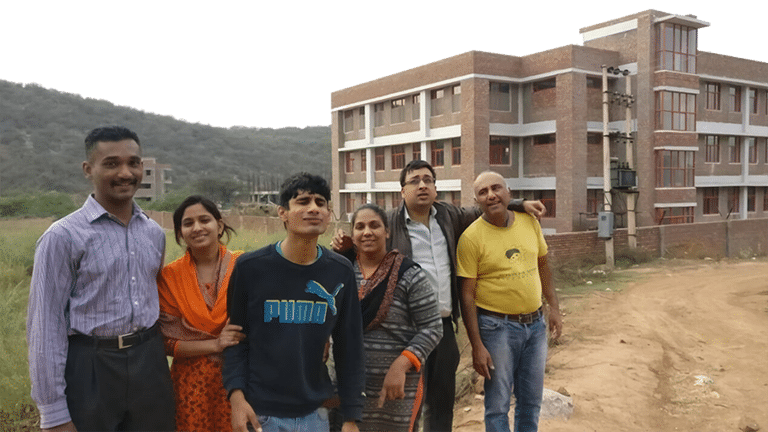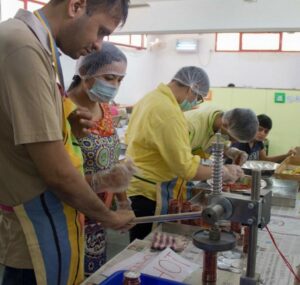Tasting Success: Auspice Social’s Recipe for Meaningful Employment and Inclusion
Featured Members

Finding meaningful employment can be a daunting task for individuals with Autism Spectrum Disorder (ASD). Research shows that despite having valuable skills and talents, people with ASD often encounter discrimination in the workforce and continue to struggle with extremely high unemployment and underemployment rates. Auspice Social is a purpose-driven social enterprise headquartered in Uttar Pradesh, India working to change this reality by providing job opportunities and skills training for individuals on the autism spectrum.
Recently, the Council for Inclusive Capitalism interviewed Parag Ghosh, the CEO and founder of Auspice Social, to learn how inclusive hiring practices can help address the employment gap in the autistic community.
Tell us more about Auspice. How did it begin and what was the inspiration behind it?
Ghosh: After my daughter was born in 2007, she was diagnosed with Autism Spectrum Disorder (ASD) around the age of one, and that was my first introduction. We learned a lot about the disorder through our own research and by connecting with other parents who also had children diagnosed with ASD. Many of those other parents shared a similar concern – what happens to our children when we’re gone? I knew something must be done to give our children and those like them more options for what to do next in their future. At the time, some companies were beginning to hire more autistic people, but it was still tailored to the needs of their neurotypical coworkers. So, I thought, let’s create a company where the majority of folks hired have ASD with a workplace culture that caters to their needs.
We originally did a pilot program in association with Action for Autism and the National Center for Autism in New Delhi where we hired 12 people of various ages on the autism spectrum to fill and label bottles of simple spices. We noticed these employees were taking a real interest in it. That was validating to see how much joy it brought them and how they were also able to support each other through challenges in a unique way as individuals who shared ASD.
Then the COVID-19 pandemic happened. Our small center for spice processing was closed for more than two years, but it gave me time to think about how to take our initiative one step further. I incorporated the company as a formal partner with the National Center for Autism, so that they can give us the necessary knowledge and help scale this. As we continued to expand our operations, we knew that people are suited for different tasks, so we made sure to tailor our expansion accordingly. Our goal is to ensure all our employees feel a sense of accomplishment and increase their financial inclusion with more economic opportunities to support themselves.
What are your goals for the future of Auspice as you continue to grow and expand?
Ghosh: I was recently reading about some statistics, and according to the World Health Organization, 1 in 100 children globally have autism. This is a huge population and initiatives like Auspice have a role to play. Someday I’d like to expand to 10,000 employees with ASD, and every person does something creative, something productive. We also hope as our business expands it will help advance social acceptance. When people are working alongside those with ASD or buying products and appreciating their workmanship, they can appreciate the value they bring to our society. And one more ambition, when I think of this organization in the future, I would like the company to someday be headed by a person with ASD. But at the least some people with ASD would hold positions of leadership.

How do you approach the hiring process differently to better connect with candidates diagnosed with ASD?
Ghosh: When hiring, we didn’t want to focus on typical hiring questions. Instead, we wanted to keep it more conversational, understand why working with us might excite them, what they’re passionate about, and how to find something that fits their skills and talents. Hiring for us is a free flowing conversation. They tell us about whatever they want me to know and we ask questions based on that.
How does Auspice accommodate the needs of the ASD community?
Ghosh: We have a few systems in place to make sure our employees feel supported and can reach their full potential with us. All of our work stations, regardless of the task, have clear visual aids to remind employees of the process and have a place to look if they are feeling lost or need some reminders while completing their work. We also aim to have 1 supervisor for every 10 employees. While the roles of these supervisors are also to track operations and productivity, they are also there to provide on-site support as it’s needed throughout the day and ongoing training.
Visuals have been really important for employee success, so we hope in the future to have video instructions that employees can learn from, but more importantly turn back to as a clear reminder and aid throughout the day. As we grow, we continue to keep the mindset: how does our scale affect our employees and how can they grow here as well? For example, we’ve changed some of the machinery we use, and while loud noises can be difficult for some with ASD, others were excited and able to meet the challenge while others found their niche in different aspects of the production line with quieter machines. Ensuring that we set our employees up for success has allowed them to excel in their roles and our business to excel in the process.

Why a business? Why not a foundation or a nonprofit?
Ghosh: It’s hard, nonprofit organizations are dependent on donors to continue their support. If tomorrow those donations stop, you have to figure out another avenue to support the community. When you’re able to earn a more sustainable salary, you can plan longer term. The other reason is how much confidence it instills in individuals when they have a good job and can be around others who are also facing the same struggles. At the end of the day, my employees feel a sense of accomplishment knowing they created something of value and could contribute. I’ve found they start to set goals, to try to do more bottles a day for example. By having a good place to work, a job to feel proud about, providing for yourself and being involved in a community is a really fulfilling feeling.
How would you finish the following statement? “Business at its best is…”
Ghosh: It’s when you start a business, you make a promise to yourself to your employees. Businesses that fulfilled that promise – that is business at its best: taking care of employees and taking care of my customers equally. It’s a business that has a responsibility to society.

